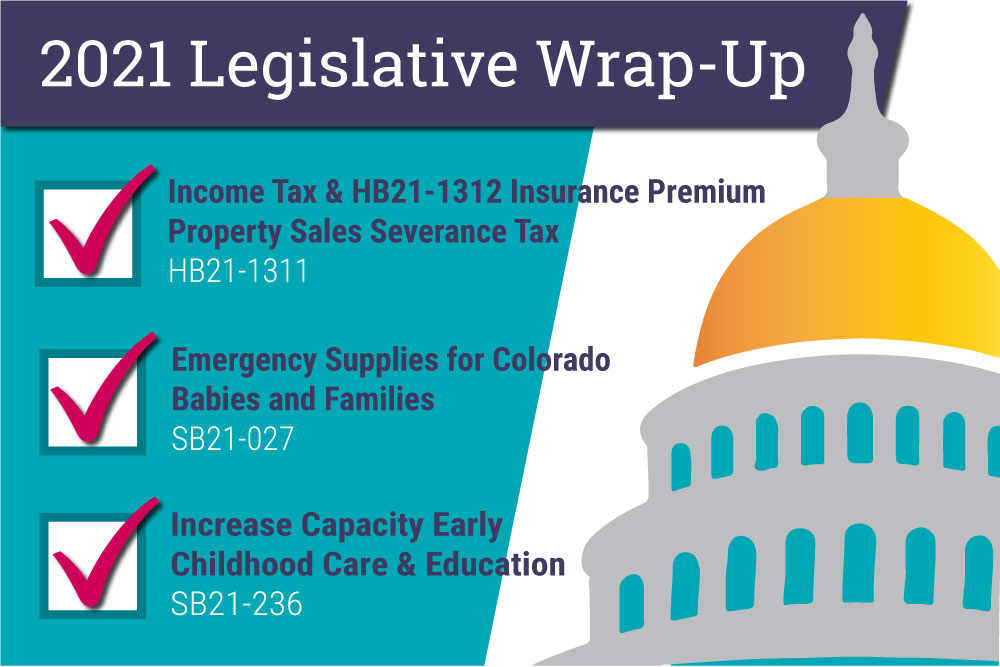
2021 Legislative Session A Win for Women on Many Fronts
“This Was Quite A Session”
Twenty-one bills WFCO took positions on passed, including two called “poverty-fighting superpowers”
When recapping the 2021 Colorado General Assembly, WFCO lobbyist Jennifer Miles, President of Frontline Public Affairs, summed it up with one thought: “This was quite a session.”
Although the number of bills that was introduced was similar to previous years, more than 80% of bills passed, an “incredibly high percentage,” according to Miles. Two driving forces behind the successful 2021 session were the windfall of extra state revenues and federal stimulus cash that gave lawmakers spending flexibility that they have not had in years. Among the bills that benefited were The Women’s Foundation’s top-three priority bills and 21 of 22 that The Foundation took positions on. Clearly, WFCO’s goals of gender, racial, and economic equity aligned with the goals of the House and Senate.
“The pandemic laid bare the inequities in our society,” said Miles. “Recovering and coming back stronger was a theme. There was more of an emphasis on equity than I have seen in previous years.”
WFCO’s Top Three Priorities Pass
WFCO’s priority bills – where we allocated lobbying resources – will bring more flexible and holistic resources to women and their families, especially those most vulnerable to systemic inequities. Through the WFCO Relief Fund and in learning from our WAGES grantee partners, we know that many families in Colorado still are unable to meet their basic needs, such as housing, food, and transportation. Giving families access to cash and essential resources is critical in their being able to move forward financially.
HB21-1311 Income Tax & HB21-1312 Insurance Premium Property Sales Severance Tax
These two tax reform bills change tax loopholes that were disproportionately helping certain companies and high-income individuals. Together, the bills eliminate or reduce $350 million to $400 million in tax breaks and those dollars will be used to fund an earned income tax credit and child tax credit, which put money in the pockets of tens of thousands of low-income workers, small business owners, and families who are still struggling financially.
“These are poverty fighting superpowers, with significant positive impact shown through research,” said Miles. “It’s exciting. This is the first time funding for a child tax credit has passed in Colorado.”
The Women’s Foundation would like to acknowledge the work of Carol Hedges, executive director of Colorado Fiscal Institute and a WAGES public policy grantee, for her leadership in taking the child tax credit bill across the finish line and her advocacy for equitable fiscal reform over many years.
SB21-027 | Emergency Supplies for Colorado Babies and Families
Throughout the pandemic, many grantees reported to WFCO that many women couldn’t afford basic needs, including diapers, wipes, creams. In many cases, diaper needs can cause more anxiety than food or housing because public supports such as WIC (Women, Infants, and Children) and SNAP (Supplemental Nutritional Assistance Program) cannot be used to purchase them. Without assistance, diapering a child can cost at least $80/month.
Sponsored by four women policymakers who are also mothers, SB21-027 establishes a grant program for nonprofit entities to administer diaper distribution centers throughout the state. Federal aid the state received during the session will fund this program for two years and increase resources for food pantry assistance for Colorado families.
SB21-236 | Increase Capacity Early Childhood Care & Education
According to Early Milestones Colorado, 10% of Colorado’s child care providers closed their businesses during the pandemic. Obviously a shortage of child care providers impacts families, but it hurts the entire economy. When families can’t access care for their children, they can’t go to work. This most often impacts women, who make up the majority of single-parent households. Consequently, there are more than 20,000 fewer Colorado women working now than before the pandemic.
SB21-236 creates four new grant programs to increase the capacity for early childhood care and education, improve recruitment and retention rates for early childhood educators, and increase salaries for educators. According to National Women’s Law Center, typical annual wages for a woman working full time, year-round in the child care industry were $29,900, or approximately $14.38 per hour.
21/22 Bills Supported by WFCO Pass
Other bills that WFCO supported can broadly be categorized as supporting women’s economic equity in three areas:
- Child care and meeting the needs of families with young children. Notably, WFCO would like to call out the significance of HB21-1304, the Anna Jo Garcia Haynes Early Childhood Act, which will establish a brand new state agency, the Colorado Office of Early Childhood. Haynes, a WFCO founding mother, has been a decades-long pioneer in strengthening Colorado’s child care ecosystem.
- Reproductive healthcare access. It was a “major year for women’s health,” said Miles, with legislation passing that significantly expands Medicaid coverage for family planning services and fosters birth equity.
- Resources to meet basic needs, including education and employment. WFCO supported many bills in this arena, including creating mechanisms to protect affordable housing and a plan to phase out a subminimum wage that can pay individuals with intellectual and developmental disabilities 15% lower than the minimum wage.
For a complete list of all bills WFCO took positions on and their outcomes, visit our 2021 legislative session page.
WFCO would like to thank all of our direct-service grantees for their insights and feedback on the most urgent needs of Colorado women, and our public policy grantees for their partnership on a successful legislative session – 9to5 Colorado, the Bell Policy Center, Colorado Center on Law and Policy, Colorado Children’s Campaign, Colorado Fiscal Institute, Denver Metro Chamber Leadership Foundation, Executives Partnering to Invest in Children, and Young Invincibles. We would also like to acknowledge and thank our supporters of our public policy work, including WomenGive and The Chambers Fund, a donor-advised fund housed at WFCO.

